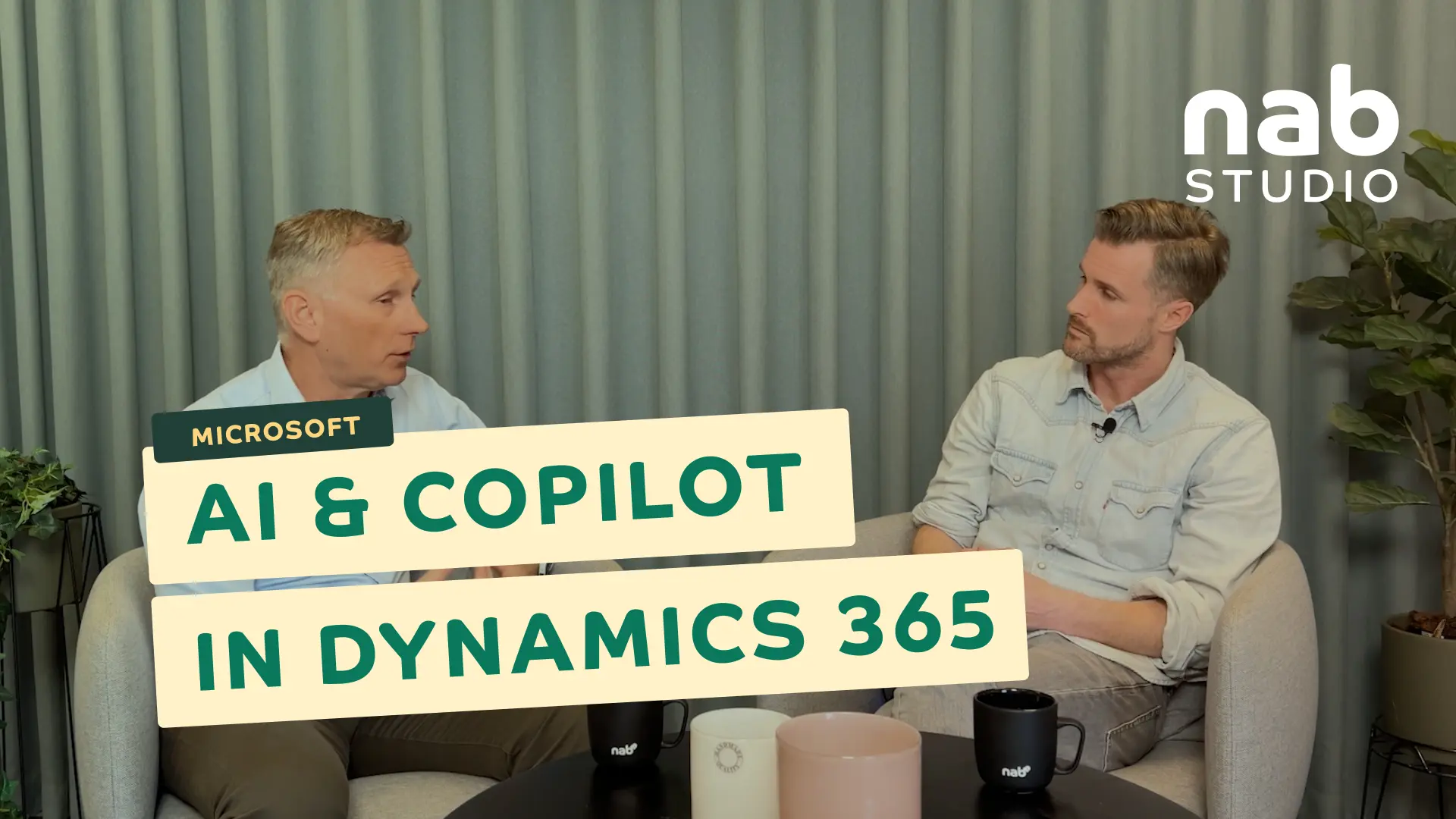
Our products

Industry solutions

About us

News

Clients
Customer service
Our products
Dynamics 365 ERP
Business Central
Get the scalability and security of Business Central
AI / Copilot
Copilot
Reach new heights with AI
Copilot Studio
Create your own AI models
Dynamics 365 CRM
Sales
Empower your sellers and accelerate revenue
Customer Insights
Create engaging customer experiences
Customer Service
Deliver consistent, personalized support
Business Intelligence
Power BI
Base your decisions on real-time insights
Power Platform
Power Apps
Custom made apps for your business' needs
Power Automate
Automate business processes
News
/
Real-Life Work Benefits of Microsoft AI
Real-Life Work Benefits of Microsoft AI
October 24th, 2024
In 2024, Microsoft invested in Figure AI, a startup developing an AI-powered humanoid robot named Figure 01. This robot is designed to handle dangerous tasks unsuitable for humans, potentially helping with labor shortages and enhancing workplace safety.

No one can deny that Figure 01 is very impressive, however it might not exactly benefit you at your office. Well, with Microsofts extensive AI budget, they have the ability to not only build cool robots, but also create AI tools to improve your everyday work life. In this Article we delve deeper into the real-life work benefits of Microsoft AI.
- Increased Productivity
Automation of Routine Tasks: Automate repetitive tasks such as data entry, scheduling, and email management with AI tools like Microsoft Power Automate. Using a tool like Power Automate allows you to save time on mundane activities and focus on more strategic tasks.
Smart Suggestions: Microsoft Word and Excel provide AI-powered suggestions for writing, data analysis, and formatting. AI-driven tools like Copilot in Microsoft 365 apps offer real-time assistance, enhancing your workflow.
- Enhanced Collaboration
Meeting Insights: Microsoft Teams uses AI to transcribe meetings, highlight key points, and generate actionable items. Ensure everyone is on the same page with automated meeting summaries and follow-up tasks.
Communication Support: AI-powered translation and transcription services break down language barriers, facilitating smoother communication in global teams.
- Data-Driven Decision Making
Advanced Analytics: Use Power BI for sophisticated data visualization and analysis, uncovering insights from complex datasets. AI models predict trends and identify patterns, helping you make informed business decisions.
Personalized Insights: Excel’s AI features analyze data trends and suggest relevant charts and graphs. Power BI’s integration with AI models allows for deeper insights into business metrics.
- Improved Customer Service
AI Chatbots: Deploy AI-driven chatbots to handle customer inquiries, providing instant support and freeing up human agents for more complex issues. Bots can be integrated with Dynamics 365 for seamless customer relationship management.
Personalized Customer Interaction: AI analyzes customer data to provide personalized recommendations and support, enhancing customer satisfaction and loyalty.
- Enhanced Creativity and Innovation
Content Generation: AI tools like Copilot assist in drafting emails, documents, and presentations, sparking new ideas and improving content quality. Design suggestions in PowerPoint help create visually appealing presentations effortlessly.
Research and Development: AI accelerates research by analyzing vast amounts of data, identifying trends, and providing insights that drive innovation.
- Time and Task Management
Smart Scheduling: Microsoft Outlook’s AI capabilities suggest optimal meeting times and manage your calendar efficiently. AI-powered reminders and task management tools help you stay organized and on top of deadlines.
- Security and Compliance
Enhanced Security: AI-driven security features detect and respond to threats in real-time, protecting your data and systems. Microsoft Defender uses AI to provide advanced threat protection, safeguarding your workplace from cyber-attacks.
Regulatory Compliance: AI helps ensure compliance with industry regulations by monitoring and analyzing data, identifying potential compliance issues.
In essence, while humanoid robots like Figure 01 capture our imagination, it’s the everyday applications of Microsoft AI that truly revolutionize the modern workplace, enhancing efficiency, collaboration, and decision-making across industries. As Microsoft continues to invest in AI research and development, the potential for transformative impact on work life remains boundless.
Get in touch!
Unsure? Contact us and we’ll help you!
Do you want to talk to an expert?
Thank you for your message! We will contact you shortly.
Microsoft’s Vision for the Future of AI
October 15th, 2024
In the article “Understanding Artificial Intelligence,” we briefly introduced general AI and superintelligent AI, hinting at the potential future of AI. This piece delves deeper into Microsoft’s vision for the future of AI, highlighting how one of the world’s leading technology companies envisions AI’s evolution and its potential impact on society.

Empowering Developers and Businesses
Microsoft aims to democratize AI by providing powerful tools and platforms that enable developers and businesses to build, deploy, and manage AI solutions efficiently. This includes services like Azure Machine Learning and the Cognitive Services suite, which offer pre-built APIs for vision, speech, language, and decision-making tasks.
AI Integration in Products and Services
Microsoft is embedding AI across its product portfolio to enhance user experiences and increase productivity. For instance, AI features in Microsoft 365 help users with tasks like writing, data analysis, and meeting management. Similarly, AI-driven insights in Dynamics 365 assist businesses in optimizing operations and improving customer engagement.
Advancing AI Research
Microsoft Research is at the forefront of AI innovation, conducting cutting-edge research in areas such as natural language processing, computer vision, and reinforcement learning. Their efforts aim to push the boundaries of what AI can achieve, moving closer to the goal of creating general AI systems capable of performing a wide range of tasks with human-like intelligence.
AI in the Cloud
Cloud computing is a significant component of Microsoft’s AI strategy. Azure, Microsoft’s cloud platform, provides a robust infrastructure for AI development and deployment. Azure AI services enable businesses to integrate AI capabilities into their applications, facilitating innovation and enhancing operational efficiency.
Future Prospects
Looking ahead, Microsoft aims to maintain its leadership in AI by working closely with universities, businesses, and governments. They are investing a lot in AI research and development to make big breakthroughs that will bring us closer to creating general AI and, eventually, superintelligent AI. As these technologies grow, Microsoft is committed to making sure AI developments are positive, fair, and aligned with human values.
Get in touch!
Unsure? Contact us and we’ll help you!
Do you want to talk to an expert?
Thank you for your message! We will contact you shortly.
Microsoft Copilot: Revolutionizing Productivity with AI
September 18th, 2024
Microsoft Copilot is a suite of AI-powered tools integrated into various Microsoft products, designed to enhance productivity and streamline workflows. Leveraging advanced machine learning models, Copilot acts as a personal assistant within applications, offering contextual suggestions, automating repetitive tasks, and providing intelligent insights. Here’s a closer look at Microsoft Copilot!

Key Features of Copilot:
- Smart Assistance
Suggestions: Copilot offers helpful suggestions while you work in Word, Excel, and PowerPoint, such as text completions and design ideas.
Real-time Help: In Microsoft Teams, Copilot can summarize meetings and generate action items.
- Task Automation
Workflow Automation: Automate repetitive tasks like data entry and formatting in Excel and Word.
Integration: Use with Power Automate to create automated workflows across Microsoft 365 apps.
- Intelligent Insights
Data Analysis: Analyze data, suggest formulas, and create charts in Excel.
Content Creation: Draft emails, documents, and code snippets.
- Creative Support
Design Help: Get design suggestions for PowerPoint presentations.
Writing Assistance: Receive prompts and content improvement suggestions.
Integration with Microsoft 365
Getting started with Copilot is exctreamly easy, since it’s already integrated with Microsoft 365. Copilot is built into:
- Word: For writing help and formatting.
- Excel: For data insights and automation.
- PowerPoint: For design and content ideas.
- Teams: For meeting summaries and action items.
Get started with Microsoft Copilot today!
More posts in this category



Get in touch!
Unsure? Contact us and we’ll help you!
Do you want to talk to an expert?
Thank you for your message! We will contact you shortly.
Microsoft’s Core AI Technologies
August 28th, 2024
Microsoft has been at the forefront of artificial intelligence (AI) innovation, leveraging its extensive research and development capabilities to create advanced AI technologies. Here are some of the core AI technologies developed by Microsoft:

Azure AI
Azure Machine Learning: A cloud-based service that allows data scientists and developers to build, train, and deploy machine learning models quickly. It provides tools for automated machine learning, data labeling, and model management.
Azure Cognitive Services: A suite of pre-built APIs that allow developers to integrate AI capabilities such as vision, speech, language, and decision-making into their applications. These include services like Computer Vision, Speech to Text, Text Analytics, and Anomaly Detector.
Microsoft Cognitive Toolkit (CNTK)
An open-source deep learning toolkit that supports a wide range of neural network types, allowing for scalable and efficient training of models. CNTK is known for its speed and flexibility, supporting both Python and C++ APIs.
Bot Framework
A comprehensive framework for building enterprise-grade conversational AI experiences. The Bot Framework enables developers to create bots that can interact with users across various platforms like Microsoft Teams, Skype, Slack, and more.
AI at the Edge
Solutions that bring AI capabilities to edge devices, allowing for real-time data processing and decision-making. This includes Azure IoT Edge, which extends cloud intelligence to local devices.
Custom Vision
A service within Azure Cognitive Services that allows users to build and deploy custom image classification models. It simplifies the process of training models with labeled images, enabling quick and efficient deployment of custom vision solutions.
Microsoft Research AI
An internal research division dedicated to advancing the state of the art in AI. Microsoft Research AI focuses on areas such as machine learning, natural language processing, computer vision, and human-computer interaction.
Dynamics 365 AI
AI-driven insights and analytics embedded within Microsoft’s Dynamics 365 business applications. These AI capabilities help organizations improve customer experiences, optimize operations, and drive innovation through data-driven insights.
These core AI technologies showcase Microsoft’s commitment to advancing AI and making it accessible for businesses and developers to solve complex problems and create innovative solutions.
More posts in this category



Get in touch!
Unsure? Contact us and we’ll help you!
Do you want to talk to an expert?
Thank you for your message! We will contact you shortly.
Understanding Artificial Intelligence
August 20th, 2024
Artificial intelligence (AI) has become a transformative force in the tech industry, reshaping how businesses operate and enhancing everyday experiences. Among the leading pioneers in this field is Microsoft, leveraging its extensive resources and expertise to develop cutting-edge AI technologies. From integrating AI into its flagship products like Microsoft 365 to advancing research in machine learning and natural language processing, Microsoft is at the forefront of making AI accessible and beneficial for all.

What is AI?
Artificial intelligence (AI) is when computers are made to think and learn like humans. This means they can do things like understand speech, recognize pictures, play games, and solve problems. AI is used in things like virtual assistants (like Siri and Alexa), movie recommendations on Netflix, and even self-driving cars. It’s all about making machines smarter and more helpful.
Types of AI
Narrow AI: AI designed to do one specific task. For example a chess computer that only plays chess.
General AI: AI that can understand, learn, and apply intelligence to any problem, just like a human. This type of AI doesn’t exist yet; it would be like having a robot that can learn anything and do any job humans can do.
Superintelligent AI: AI that surpasses human intelligence in every way. This is a theoretical future AI that could solve all kinds of complex problems better than any human.
So, Narrow AI is like a specialist, General AI would be like a jack-of-all-trades, and Superintelligent AI would be like a genius at everything.
Increasing presence of AI in everyday life
Microsoft AI is leading the charge in transforming industries and shaping the future of technology. From everyday tasks to groundbreaking innovations, AI is becoming increasingly integrated into our lives, thanks to Microsoft’s dedication to making it accessible and beneficial for all. As AI continues to evolve, Microsoft remains at the forefront, pioneering new possibilities and revolutionizing the way we live and work.
More posts in this category



Get in touch!
Unsure? Contact us and we’ll help you!
Do you want to talk to an expert?
Thank you for your message! We will contact you shortly.